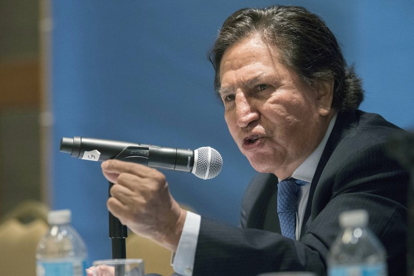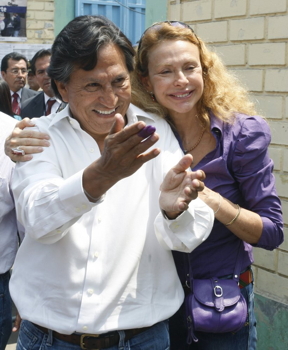
(above) En esta imagen del 24 de mayo de 2018, el expresidente peruano Alejandro Toledo durante un discurso en Naciones Unidas. (AP Foto/Mary Altaffer, Archivo)
US judge denies bail to ex-Peru president in corruption case
September 13, 2019 - Original article: AP News
By OLGA R. RODRIGUEZ
SAN FRANCISCO (AP) — A U.S. judge in San Francisco denied bail to former Peruvian President Alejandro Toledo in a hearing Thursday that ended with an emotional outburst by his wife, who had to be dragged out of the courtroom after she started shouting at prosecutors.
 (below) FILE - In this April 10, 2011 file photo Presidential candidate Alejandro Toledo, accompanied by his wife Eliane Karp, greet supporters outside a polling station after casting his ballot in the general elections in Lima, Peru. A federal judge in San Francisco has denied bail to former Peruvian President Toledo in an extradition hearing that ended with an emotional outburst by his wife who had to be dragged out of the courtroom after she started shouting at prosecutors. (AP Photo/Juan Diego Contreras,File)
(below) FILE - In this April 10, 2011 file photo Presidential candidate Alejandro Toledo, accompanied by his wife Eliane Karp, greet supporters outside a polling station after casting his ballot in the general elections in Lima, Peru. A federal judge in San Francisco has denied bail to former Peruvian President Toledo in an extradition hearing that ended with an emotional outburst by his wife who had to be dragged out of the courtroom after she started shouting at prosecutors. (AP Photo/Juan Diego Contreras,File)
Magistrate Judge Thomas S. Hixson denied bail for the second time to Toledo, 73, who is wanted in his native country in a corruption scandal.
“Dr. Toledo has not carried the burden of proof to show he is not a risk of flight, and so I’ll maintain the detention order,” Hixson said.
Shortly after, Toledo’s wife, Eliane Karp, began cursing and shouting at prosecutors, saying they will be “personally responsible for his death,” and was dragged by guards out of the courtroom.
“It’s the life of a man, goddam it! You’re killing him!” Karp, 65, shouted.
Three days after Toledo’s July 16 arrest on an extradition request at his Menlo Park home, Hixson ordered him held in custody, reasoning that if he fled it “would be a diplomatically significant failure of the United States to live up to its treaty obligations to Peru.”
Toledo has been held in solitary confinement at Santa Rita Jail in Alameda County since his arrest. His attorney, Graham Archer, argued for the former president to be released on bail and put on house arrest, saying Toledo’s mental health is deteriorating.
“It’s a shame he has been in there for two months,” Archer said.
“The idea that as a country we would present ourselves to the outside world as holding a non-violent, former head of state in solitary confinement during an extradition preceding, I think, that would be diplomatically unacceptable.”
Archer said Toledo was aware of the attempt to extradite him since early 2017 and had not tried to flee California, where he lived as a permanent legal resident and where he has a group of longtime friends, including Stanford University professors, who are willing to put up cash and homes to pay a $1 million bail.
Federal prosecutor Elise LaPunzina said the bond plan presented by his defense, paid by friends, “is not adequate at all.”
“Mr. Toledo and his wife are not putting anything forward (for the bond),” LaPunzina said.
“We do take issue as to his assets. There are millions of dollars that are unaccounted for,” LaPunzina added, saying a suitcase with $40,000 in cash was found at the Toledo home during his arrest.
She said the couple paid $6,400 monthly in rent, took frequent trips to Washington and is paying several attorneys. Archer, Toledo’s attorney in the extradition case, is a public federal defender.
In an August hearing, Hixson asked prosecutors to present him with other detention options, saying the situation with Toledo, “it’s not a good one” and could mean “solitary confinement for a number of years.”
LaPunzina said he could be housed in a unit of the jail away from the general population but with other inmates who like him “have to be watched more closely.”
The judge set a new hearing for Oct. 17.
The Peruvian government requested Toledo’s extradition earlier this year to stand trial on charges of influence-peddling and money laundering.
He was a visiting scholar at Stanford University as recently as 2017, though the school has said it was an unpaid position. He had been living near the university and writing a book.
The charges stem from allegations that he took $20 million in bribes from Odebrecht, a Brazilian construction company at the center of Latin America’s biggest corruption scandal.
Toledo, who has denied wrongdoing, was Peru’s president from 2001 to 2006.
Three other former Peruvian presidents have been involved in the Odebrecht corruption scandal.
In April, former leader Alan García, who was president after Toledo, killed himself with a gunshot to his head as officers waited to arrest him in a graft probe linked to the scandal. Former President Ollanta Humala, who was in office from 2011 to 2016, and his wife were in prison for nine months, and ex-leader Pedro Pablo Kuczynski, who left office last year, is under house arrest.